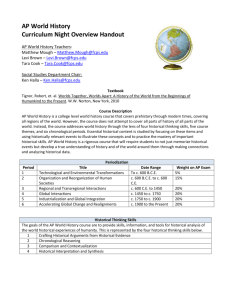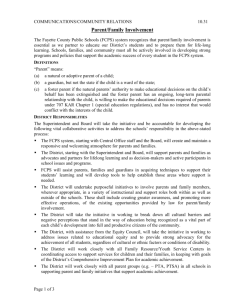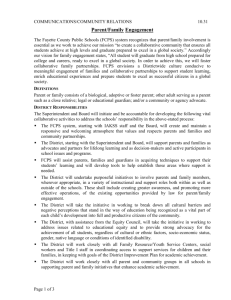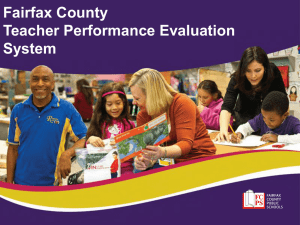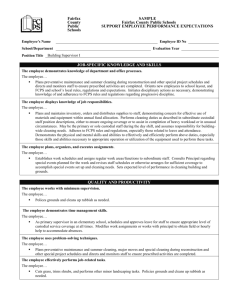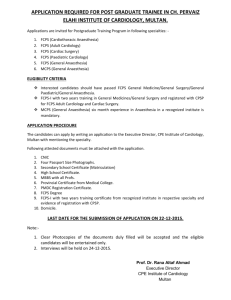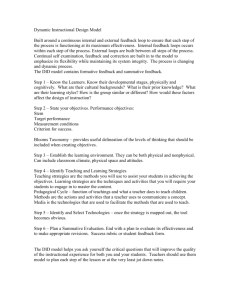Teacher Evaluation Standards
advertisement
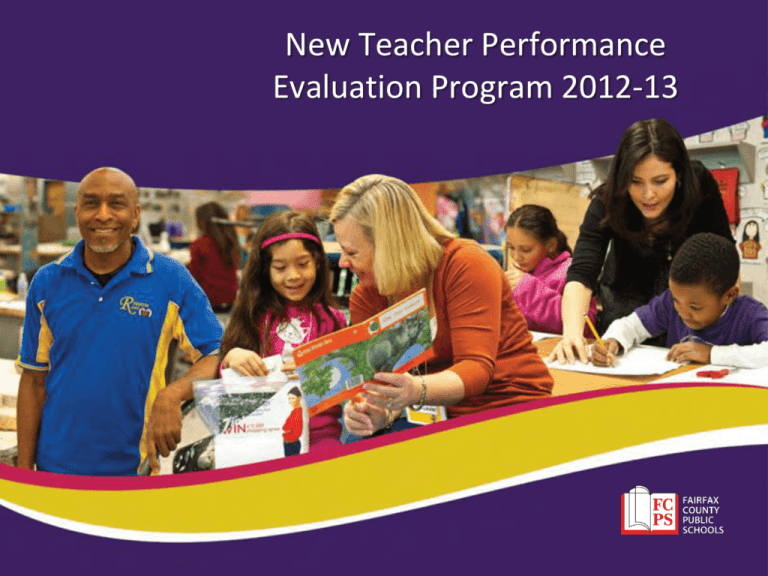
New Teacher Performance Evaluation Program 2012-13 Outcomes Participants will become familiar with: • The revised handbook, resources, and tools • Professional development opportunities and support for the new evaluation system “In FCPS all schools will build professional learning communities that employ best practices to raise the bar and close achievement gaps. All educators will use the Program of Studies to ensure all students reach their full potential with an expectation that students will read on grade level and graduate on time.” -Jack D. Dale 8.8.12 Check for Understanding When and why did VDOE revise the Guidelines for Uniform Performance Standards and Evaluation Criteria for Teachers? How many standards are there? Can you name them? What are the similarities and differences between our former evaluation system and current evaluation system? What are the changes? • • • • • Seven standards instead of five Standard 7 is Student Academic Progress Matrices are used to rate the teacher Four rating levels, as opposed to three A minimum of one formal and three informal/miniobservations • In addition to the goal-setting conference and documentation log, administrators are required to collect a minimum of four data sources • Final evaluation conference between the evaluator and teacher is required for teachers in their summative evaluation year 7 Change is necessary … If nothing ever changed, there would be no butterflies. - Author Unknown 8 Primary Purpose of the FCPS Teacher Performance Evaluation Program “To help both teachers and their evaluators collect more comprehensive and accurate assessment data for rating teacher effectiveness and, then to support quality teaching everyday in every classroom.” (Quote from forward of FCPS Teacher Performance Evaluation Handbook, Dr. James H. Stronge, August 2012) Timeline Training Plan Main Components PERFORMANCE STANDARD Performance Standard 1: Professional Knowledge The teacher demonstrates an understanding of the curriculum, subject content, and the developmental needs of students by providing relevant learning experiences. The teacher: 1.1 Effectively addresses appropriate curriculum standards. 1.2 Integrates key content elements and facilitates students’ use of higher level thinking skills in instruction. 1.3 Demonstrates ability to link present content with past and future learning experiences, other subject areas, and real world experiences and applications. Highly Effective Effective In addition to meeting the standard, the teacher consistently demonstrates extensive knowledge of the subject matter and continually enriches the curriculum. The teacher demonstrates an understanding of the curriculum, subject content, and the developmental needs of students by providing relevant learning experiences. Developing OR Needs Improvement The teacher inconsistently demonstrates understanding of the curriculum, content, and student development or lacks fluidity in using the knowledge in practice. Ineffective The teacher bases instruction on material that is inaccurate or outof-date and/or inadequately addresses the developmental needs of students. KEY ELEMENTS PERFORMANCE APPRAISAL MATRIX Teacher Performance Standards 1. Professional Knowledge The teacher demonstrates an understanding of the curriculum, subject content, and the developmental needs of students by providing relevant learning experiences. 2. Instructional Planning The teacher plans using the Virginia Standards of Learning, the school’s curriculum, effective strategies, resources, and data to meet the needs of all students. 3. Instructional Delivery The teacher effectively engages students in learning by using a variety of instructional strategies in order to meet individual learning needs. 4. Assessment of and for Student Learning The teacher systematically gathers, analyzes, and uses all relevant data to measure student academic progress, guide instructional content and delivery methods, and provide timely feedback to both students and parents throughout the school year. 5. Learning Environment The teacher uses resources, routines, and procedures to provide a respectful, positive, safe, student-centered environment that is conducive to learning. 6. Professionalism The teacher maintains a commitment to professional ethics, communicates effectively, and takes responsibility for and participates in professional growth that results in enhanced student learning 7. Student Academic Progress The work of the teacher results in acceptable, measurable, and appropriate student academic progress. A Closer Look at the Standards Standard 1: Professional Knowledge Look-Fors Red Flags 15 Gallery Walk 16 Critical to Success this Year • Teachers and administrators would benefit from discussing the standards and the matrices. • Start with what it looks like meeting standards - Effective, then, what it looks like exceeding standards – Highly Effective. What are some possible data sources that you could use for the different standards? Possible Data Sources Observations • There are four required observations of teachers on annual contract and teachers on continuing contract in their summative year, each with written feedback • One observation must be a formal observation with written feedback and a post-conference • Three observations are informal or mini observations • Written feedback on formal and informal observations require the use of the forms in Part 3 of the handbook • Mini observations have no specified form for feedback Possible Data Sources Documentation Log • A minimum of one and no more than three artifacts supporting each standard must be submitted for each evaluation period (summative and formative evaluation years) • Document is discussed at goal-setting conference by the October 31 deadline • Documentation reviewed at midyear conference only with teachers that are in the summative evaluation year • Completed documentation presented to evaluator prior to their preparation of summative evaluation report Possible Data Sources Student Opinion Surveys • (Optional) For use by high school teachers only • Survey samples are available in the FCPS Teacher Evaluation Handbook (also see Regulation 4428) Goal Setting for Student Progress • Appropriate measures of academic progress are determined • During first month of school, all teachers will work collaboratively with grade level or content team to create a SMARTR goal. Each teacher will fine-tune the goal to reflect the needs of their respective learners The goal will be approved by evaluator by the end of October • Midyear review of student progress goal and modify strategies with administrator (summative evaluation year only) • End-of-year review of goal attainment (all teachers) The first six standards impact student progress I. Professional Knowledge II. Instructional Planning VI. Professionalis m VII. Student Academic Progress III. Instruction al Delivery V. Learning Environment IV. Assessment of and for Student Learning What Makes Goals SMARTR? • Strategic and Specific • Measureable • Attainable • Results-oriented • Time-bound • Rigorous Teacher Performance Standard 7: Student Academic Progress The work of the teacher results in acceptable, measurable, and appropriate student academic progress. Example SMARTR goal In the current school year, all students will make measurable progress in the area of twodimensional landscape. Using a 24-point division-developed rubric to measure texture, form, space, color, tone, and line (in which 20 points is considered proficient) all students will improve at least 6 points throughout the course of the year. Students scoring a level 20 or higher will further advance their skills by learning another artistic style, such as still life. Resources • Handbook: http://www.fcps.edu/hr/epd/evaluations/teacher/PDF/TeacherHB2012-13.pdf • Crosswalk http://www.fcps.edu/hr/epd/evaluations/teacher/PDF/crosswalk.pdf • Training Plan http://fcpsnet.fcps.edu/pla/opp/teval/2012-13/Training_plan.pdf Suggested Timeline Date Items Prior to first meeting Module 1 Overview By September 7 Introduce goal setting using Power Point provided and share school improvement goal and timelines of process By September 21 CLTs meet to discuss focus for goal and pre-assessment to use (may need to create pre-assessment or identify one in place) By October 5 Administer pre-assessment By October 12 Set Goal Share data results in CLT teams Set goals as a team and refine goals as individual teachers to reflect your student population Decide on strategies as a team and/or individually By October 19 Meet in CT with administrator By October 24 Submit goal for approval to administrator By October 31 Evaluator approves goal More Information • HR Teacher Evaluation Website http://www.fcps.edu/hr/epd/ evaluations/teacher.shtml • PLA’s Homepage http://fcpsnet.fcps.edu/pla QUESTIONS? • Office of Employee Performance and Development (OPED) (571) 423 -3264 • Growth and Development Team Supporting Teacher Evaluation (571) 423 -1380
